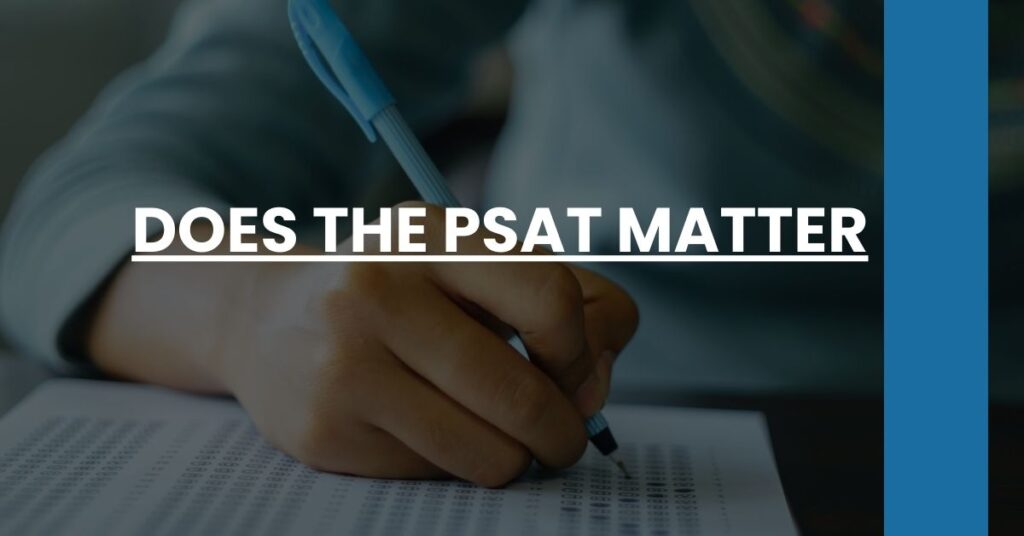The PSAT is a practice test that mirrors the SAT, and whether it matters greatly depends on your objectives. Yes, for those eyeing the National Merit Scholarship, a strong PSAT score is crucial. It’s also beneficial for all students as a benchmark for SAT preparation and gauging readiness for college admission tests.
In this article, you’ll discover:
- The role of the PSAT in scholarship and college admissions
- How PSAT scores guide your SAT/ACT study plans
- When taking the PSAT seriously can impact your academic journey
So, does the PSAT matter? Absolutely, if you’re utilizing it to unlock scholarship opportunities or shaping your test prep strategy.
- Introduction to the PSAT
- The Role of the PSAT in the National Merit Scholarship Program
- How Colleges View PSAT Scores
- PSAT as a Benchmarking Tool
- The Connection Between the PSAT and SAT Prep
- Does the PSAT Matter for All Students?
- Strategic Decisions Around Taking the PSAT
- Implications of PSAT Scores Beyond College Admissions
- Conclusion: Making an Informed Decision About the PSAT
Introduction to the PSAT
As you embark on the path towards college, you might be wondering about the Preliminary SAT, more commonly known as the PSAT. What is it? Simply put, the PSAT is a standardized test that acts as a primer for the SAT—a test often critical for college admissions. It’s offered by the College Board and consists of three versions: the PSAT/NMSQT for sophomores and juniors, the PSAT 10 for sophomores, and the PSAT 8/9 for younger students.
You’ll find the PSAT/NMSQT, which is the focus here, covers a plethora of areas including math, reading, and writing. It’s designed not to intimidate you with its content but rather to prepare you for the types of questions and the testing environment you’ll encounter when you take the SAT. Think of it as a dress rehearsal—one that gives you a chance to perform under similar conditions to the actual event, minus the pressure.
However, it’s not just about practicing for the SAT—the PSAT/NMSQT can also open doors to scholarship opportunities. Scores from this test are used to determine eligibility for the National Merit Scholarship Program, an academic competition that lauds high-achieving students with recognition and financial awards.
The Role of the PSAT in the National Merit Scholarship Program
The question, “does the PSAT matter?” gains considerable weight when you consider its connection to the National Merit Scholarship Program. If you’re aiming for prestigious scholarships, your PSAT/NMSQT score is much more than a practice run—it’s a ticket to potential funding for your college education.
As you tackle the PSAT/NMSQT, it’s crucial to understand that this isn’t just another practice test. It’s essentially the only gateway to becoming a National Merit Scholar. High scorers on the PSAT/NMSQT may qualify as semifinalists and, eventually, finalists—positions that carry not only a hefty degree of academic honor but also the possibility of scholarships, both from the National Merit Scholarship Corporation and from various colleges and organizations aiming to attract top-notch students. For many, the financial assistance gleaned from these scholarships is transformative, potentially making an expensive dream school an affordable reality.
As you prepare for this opportunity, it’s important to check the specific details of the scholarship program, marking key dates and requirements in your calendar, and aligning your test-preparation strategy to meet this goal.
How Colleges View PSAT Scores
When you’re sweating over those PSAT practice tests, a moment of doubt may cross your mind: “Do colleges even care about my PSAT score?” Let’s set the record straight. Generally, colleges do not consider your PSAT scores in their admissions decisions. They really are private practice—unless, of course, you achieve National Merit recognition. This accolade might not be part of your admissions packet, but it does shine a favorable light on your application and can prime you for additional scholarship considerations.
There’s an additional benefit to performing well on the PSAT. With your permission, your scores can be shared with colleges through Student Search Service, meaning your inbox and mailbox might soon be bursting with personalized brochures and invitations to visit campuses or consider applying. This early recruitment process can be an unexpected but pleasant outcome of taking your PSAT scores seriously, even if the scores themselves aren’t directly reviewed by admissions offices.
For a closer look at who gets to see your PSAT scores and how they might be used in ways you hadn’t considered, this information can offer further enlightenment.
PSAT as a Benchmarking Tool
Now, onto practical matters: using your PSAT score to inform your future SAT or ACT efforts. After receiving your scores, you’ll gain access to a detailed score report. This analysis provides invaluable insights into your current academic abilities and highlights the areas where you excel or need improvement.
Here’s how you can use your PSAT results as a benchmark:
- Identify Strengths and Weaknesses: Which subjects came easily? Where did you stumble?
- Guide your Study Plan: Dedicate more time to studying for sections where your score was lower.
- Set Realistic Expectations: If you scored particularly high on the PSAT, you might expect similar success on the SAT—with a well-detailed study plan, of course.
The Princeton Review suggests that your PSAT score has predictive power for your future SAT scores, thus arming you with the knowledge to customize your test prep. When you view your PSAT results, don’t just focus on the scores themselves; pay close attention to the subtopic analysis. It’s here that you’ll discover the nuances of your test-taking abilities, and it’s from here that you can launch a targeted study campaign to boost your eventual SAT or ACT scores.
The Connection Between the PSAT and SAT Prep
The PSAT isn’t just a litmus test for the SAT; it’s a study guide in disguise. Both tests are crafted by the College Board, which means the types of questions, the timing, and even the pressure you experience during the PSAT are closely aligned with what you’ll face on the SAT.
Here’s the kicker: By understanding your PSAT scores, you’re effectively holding a map to navigate your SAT journey. The College Board even provides free, personalized SAT preparation through Official SAT Practice on Khan Academy, tailored to your PSAT results. This alignment guarantees that the time you invest in dissecting your PSAT performance is doubly beneficial—it’s shaping you for SAT success.
Consider this: The SAT generally covers more advanced content and may have a wider array of question types, given its broader intent. Keep in mind as you review your PSAT feedback that similar question structures and topics will appear on the SAT—so mastering your PSAT weaknesses translates to direct SAT gains.
Does the PSAT Matter for All Students?
You’re likely considering the weight of the PSAT for a variety of reasons—scholarships, practice, or perhaps as a measure of your academic prowess. The real question is not “does the PSAT matter?” but rather “how does the PSAT matter to you?”
For high-achievers with eyes on the National Merit Scholarship, the PSAT/NMSQT is your arena to shine. For others, it’s a diagnostic tool, signaling areas to improve for the SAT or ACT. And then, some may see it as a confidence booster and a means to ease into the world of standardized testing without immediate stakes.
The College Board highlights varied benefits of the PSAT, from connecting students with colleges to offering a detailed report card for academic progress. So, regardless of your end goal, the PSAT has a purpose that serves every student’s unique path to higher education.
Strategic Decisions Around Taking the PSAT
Let’s strategize. When should you take the PSAT to heart, and when might you shift focus to other pursuits? If college-bound ambitions drive you, especially if you eye the competitive tiers, treating the PSAT with the same respect as the SAT could give you a one-up.
But remember, the PSAT is optional. You’ve got a demanding schedule with coursework, extracurriculars, and perhaps other standardized tests. If National Merit isn’t in your sights, it might be more practical to concentrate on solidifying your GPA or dedicating time to your passion projects, each of which also plays a significant role in your college application narrative.
That being said, The Princeton Review advises not to underestimate the forecasting ability of the PSAT. Even if you’re not chasing scholarships, the test offers a valuable preview of your test-taking skills under timed conditions, something classroom quizzes can rarely mimic.
Implications of PSAT Scores Beyond College Admissions
Yes, you read that right—there’s life for your PSAT scores beyond scholarship doors and SAT prep. Your PSAT results can influence your academic path in other ways, such as:
- Advanced Coursework: Demonstrating proficiency on the PSAT can lead to placement in advanced or honors classes.
- Personal Goals: Setting a personal best can boost your confidence and encourage you to set higher academic goals.
While college admissions officers won’t be poring over your PSAT scores, excelling on the test can signal to your teachers and counselors that you’re ready for more rigorous material—a consideration worth its weight in future college courses.
For deeper insights into how PSAT scores can shape your academic plans, this exploration scrutinizes the subtle but significant implications of your outcomes.
Conclusion: Making an Informed Decision About the PSAT
When the final question bell rings—does the PSAT matter?—the answer is nuanced. It depends on individual aspirations, goals, and strategies.
Recall the potency of a high PSAT score—it can yield scholarships, carve a pathway for SAT success, and even set you apart in the collegiate eyes before your applications roll in. And yet, the PSAT is but one step in your educational journey, a step that should be measured against other priorities in your academic and personal landscape.
In summary, as you stand at this crossroads, weigh the stakes of the PSAT against your comprehensive goals. It might just be the most pivotal practice test you take or an insightful snapshot of your current scholastic standing. Either way, embracing the PSAT’s opportunities with a strategic mind can pave the way for a rewarding academic career.
Ultimately, your decision to prioritize the PSAT should align with a long-term vision of success—define that vision, and let it guide you to the answer you seek.

